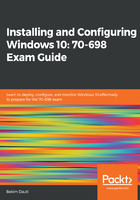
What is Active Directory-based activation?
ADBA, introduced with Windows 8 and Windows Server 2012, is a graphical user interface (GUI)-based activation method that automatically activates computers with Windows 10 generic Volume License Key (VLK) editions once they join the organization's domain. To simplify the maintenance of volume activation services for an organization network, you can use ADBA. ADBA is a role service in Windows Server 2016 that you set up to your organization's activation server by adding the Volume Activation Services role. It is a forest-wide network service that only works with Windows 8/8.1, Windows Server 2012/2012 R2, Windows 10, and Windows Server 2016. If your organization needs to activate Windows 7, Windows Server 2008 R2, and earlier versions of Windows, both desktop and server, then you need the Key Management Service (KMS) (see the next section: Implementing volume activation using a KMS). With ADBA, to maintain the active status of activation, client computers must remain members of the organization's domain. Activation lasts for 180 days, and after that, the client computers will query AD for the Activation Object. ADBA utilizes Lightweight Directory Access Protocol (LDAP) to maintain communication between the Active Directory (AD) and client computers.
Activation takes place without user intervention, and largely depends on the licensing service. Once the licensing service starts, computers with Windows 10 connect to AD automatically so they can get object activation and, with that, get activated:
